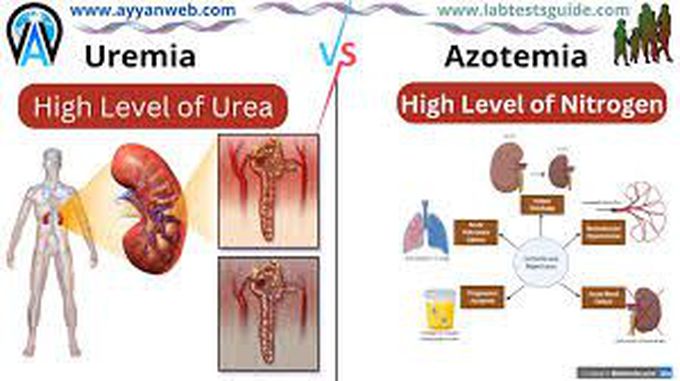Azotemia and Uremia: A Comprehensive Overview
Title: Azotemia and Uremia: A Comprehensive Overview
Introduction: Azotemia and uremia are medical conditions associated with impaired kidney function, resulting in the accumulation of nitrogenous waste products in the bloodstream. This report aims to provide a comprehensive overview of azotemia and uremia, including their definitions, causes, symptoms, diagnosis, treatment, and prognosis.
- Azotemia: 1.1 Definition: Azotemia refers to the condition characterized by abnormally high levels of nitrogenous waste products, such as urea and creatinine, in the blood. It occurs when the kidneys fail to adequately filter and eliminate these waste products.
1.2 Causes: Azotemia can arise from various underlying causes, including:
- Acute kidney injury (sudden and temporary loss of kidney function)
- Chronic kidney disease (progressive and long-term kidney damage)
- Urinary tract obstruction
- Dehydration
- Medications that can affect kidney function
- Conditions affecting blood flow to the kidneys
1.3 Symptoms: The symptoms of azotemia may vary depending on the severity of kidney dysfunction and the underlying cause. Common symptoms include:
- Fatigue and weakness
- Decreased urine output
- Fluid retention and swelling
- Shortness of breath
- Nausea and vomiting
- Confusion and altered mental status
1.4 Diagnosis and Treatment: Azotemia is typically diagnosed through blood tests that measure the levels of urea and creatinine. Treatment focuses on addressing the underlying cause and improving kidney function. It may involve managing the underlying condition, adjusting medications, providing supportive care, and, in severe cases, dialysis to remove waste products from the blood.
- Uremia: 2.1 Definition: Uremia, also known as uremic syndrome, is an advanced stage of azotemia. It occurs when there is a severe buildup of urea and other waste products in the blood due to impaired kidney function.
2.2 Causes: Uremia can be caused by a variety of factors, including:
- Chronic kidney disease that has progressed to an advanced stage
- Acute kidney injury that has resulted in severe and prolonged kidney dysfunction
- Conditions that affect the kidneys' ability to filter waste products effectively
2.3 Symptoms: Uremia presents with a wide range of symptoms that affect multiple organ systems. These symptoms may include:
- Fatigue and weakness
- Nausea, vomiting, and loss of appetite
- Cognitive impairment and confusion
- Itching and skin changes
- Muscle cramps and restless legs
- Fluid retention and swelling
- Shortness of breath and cardiovascular complications
2.4 Diagnosis and Treatment: The diagnosis of uremia involves assessing symptoms, conducting blood tests, and evaluating kidney function. Treatment aims to manage symptoms and address the underlying cause. It may involve dialysis to remove waste products from the blood, medications to control blood pressure and manage complications, dietary modifications, and kidney transplantation for eligible candidates.
Conclusion: Azotemia and uremia are conditions that arise from impaired kidney function, leading to the buildup of nitrogenous waste products in the blood. Prompt diagnosis, appropriate treatment, and management of the underlying cause are essential in improving kidney function and alleviating symptoms. Regular monitoring and collaboration with healthcare professionals are crucial for individuals affected by these conditions to optimize their long-term outcomes and quality of life.



No comments